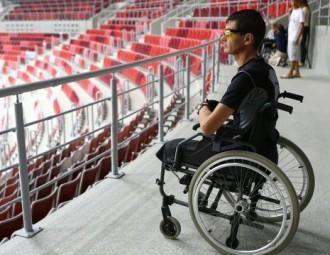Siarhei Drazdouski: Accessibility Week is a resolute challenge to the weak awareness of the society

On May 22 the events which forestall the Accessibility Week kicked off in Minsk. The first is presentation of the report on monitoring of the accessibility of the infrastructure during the IHWC-2014.
Within the framework of the Accessibility Week which is to start in Belarus on May 31 public lections, discussions, demonstration of specialized films will be held both in Minsk and in the regions.
Siarhei Drazdouski, the coordinator of the "Office on the Rights of Persons with Disabilities", spoke about the aims of the Accessibility Week with theEuroBelarus Information Service.
“Accessibility Week is something of an information campaign. We want to promote the understanding of accessibility in its broad meaning described in the Convention on the rights of persons with disabilities, - he says. – It is important that the society starts perceiving accessibility as a possibility for persons with disabilities to use social rights equally with everyone, i.e. without discrimination. For us the Accessibility Week is a resolute challenge to the weak awareness of the society, to the poor understanding of accessibility for persons with disabilities and to one of the main problem for the disabled”.
The important theme of the numerous events is a “Universal design”.
The term which we barely know and which is described in the Convention on the rights of persons with disabilities is an alternative to the modern understanding of the barrier-free environment. The concept of the universal design means that all products and the built environment should be aesthetic and usable to the greatest extent possible by everyone, regardless of their age, ability, or status in life. Universal design is applied to the design of technology, instruction, services, and other products and environments, so that there is no need to adjust them to the disabled, people who have physical impairments, children and the elderly.
“We will devote a separate discussion to the universal design, where we will explain what the universal design is and how we can use it in Belarus. Peculiarities of people’s diversity are primary. For quite a long time this approach has been used internationally, and infographic is its most widespread element, adopted on the international arena in order to avoid lack of understanding of languages”, Siarhei Drazdouski explains.
According to the coordinator of the Office on the Rights of Persons with Disabilities, this year the campaign managed to get support of its partners, who are interested in the development of the barrier-free environment, as well as attracted those who would like to join to the promotion of the rights of persons with disabilities.
“I think that the interest is connected with the success of the Accessibility Week which was held a year ago, as well as the fruitful work during the year, - Siarhei Drazdouski says. - Accessibility Week is an element of the campaign designed for the whole year and aimed at the broadening and promotion of accessibility movement within the framework of the Convention on the rights of persons with disabilities”.
-
03.01
-
07.10
-
22.09
-
17.08
-
12.08
-
30.09



























